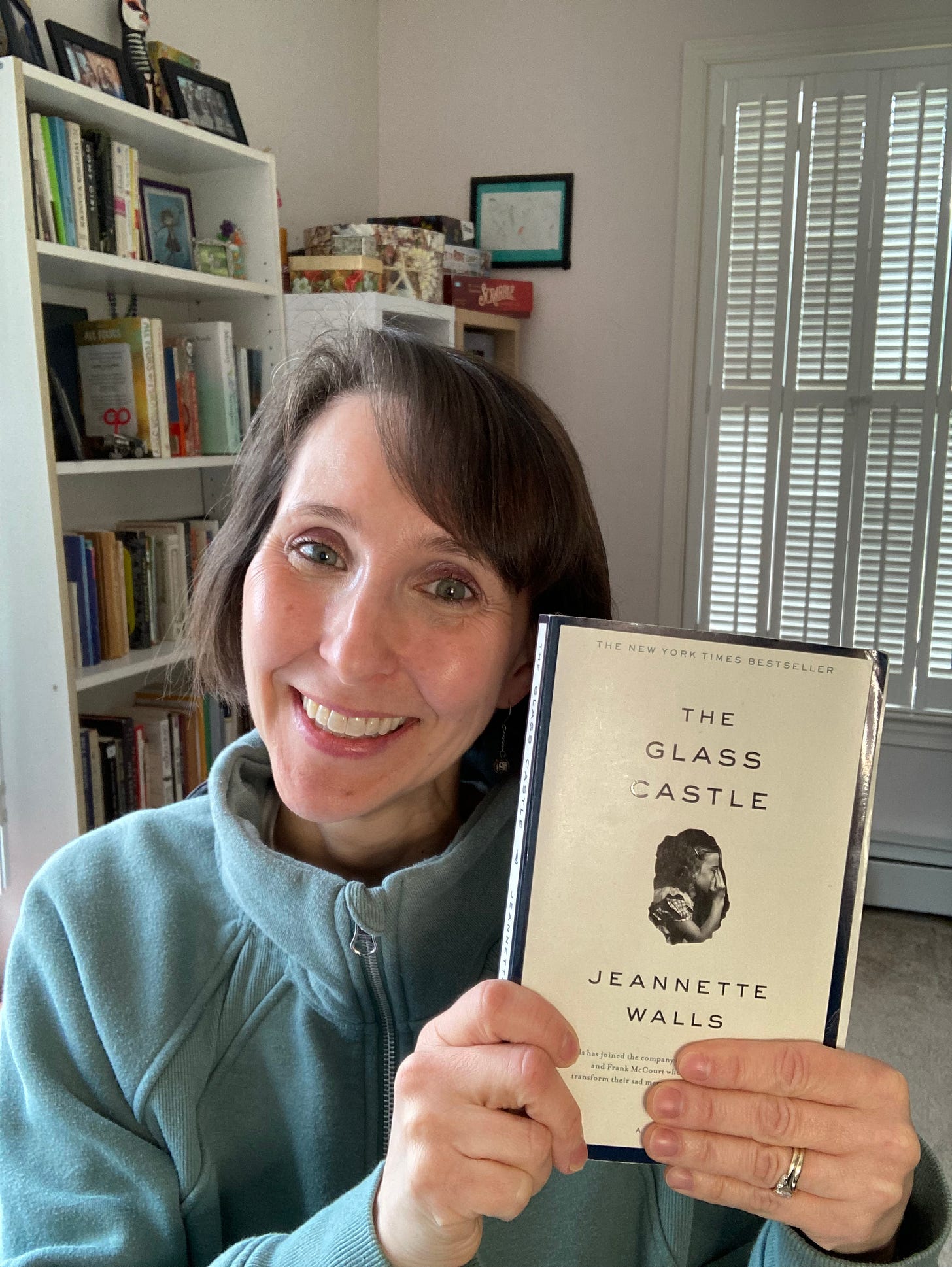Writing a memoir? Consider these alternatives...
A collaborative post w/ a memoir ghostwriter (plus tons of writing resources!)
*For writing news and resources, scroll down.*
I was chatting with a memoir ghostwriter…
The other day I got to talk with fellow Substacker
. She is a memoir ghostwriter (BTW, she has lots of resources for those of you interested in ghostwriting and freelance work), and I often teach students who are writing memoir. We’ve both noticed that many people decide to write a memoir without realizing it might not be the best way to share their stories, experiences, and life lessons.While memoirs are great for people with unique life paths, a large platform, or celebrity statuses, they aren’t the ideal route for everyone… especially if you’re hoping to get your memoir traditionally published. So Emma and I brainstormed a few alternatives to memoir writing.
(Note: This was my first time collaborating on a post with another Substack writer, and I’m so happy Emma reached out to me – this was a lot of fun.)

How do I know if memoir is for me?
If your goal is to get published and sell books, you will have the most luck with memoir when you already have a large following/audience, or if your story has a “shock factor” that will make it impossible to put down. Think Rebel Girl by Kathleen Hanna (celebrity status) or Educated by Tara Westover (shock factor). You may also have success publishing with an independent press if you have a strong background in writing (an MFA, for example) and you write absolutely stunning prose. Sonja Livingston’s memoirs and essay collections are perfect examples.
If your life story is unique and/or shocking, but you’re not sure how to write a compelling memoir, consider partnering with a memoir ghostwriter like Emma!
And if your goal isn’t to publish or make money but to write your story for your family or personal collection, memoir can be ideal as a therapeutic or cathartic process, and/or to have something of yourself to leave behind for the next generation. (I’ve talked before about the memoir my grandfather wrote, which he never tried to publish. He got a lot of satisfaction out of writing it and sharing it with friends and family. And I’m so glad he wrote down his life story, now that he’s gone.)
Why should I reconsider writing a memoir?
With memoir (which is nonfiction), you have to stick to the truth (bummer, right?), and that can be both difficult and limiting. You’ll need to tell a compelling story by recreating scenes (so you show instead of tell), but that can be a struggle when you’re relying on your imperfect memory. And if you’re intending to publish the memoir, you will likely need to fact-check. Which might mean reaching out to people you may not want to contact, or dealing with people who have an entirely different recollection of the events than you do.
Finally, though of course everyone has interesting lives, if you don’t have celebrity-status or a highly unique story, it might be a challenge to get your memoir published (or sell copies if you decide to self publish).
Some alternatives to writing memoir…
1. Autobiographical fiction
This is when you fictionalize events from your life. For instance, you might create characters that resemble real people or reframe your memories around a fictional storyline. Think On the Road by Jack Kerouac or The Bell Jar by Sylvia Plath.
With autobiographical fiction, you have more creative freedom and control.You don’t have to (in fact, I encourage you not to) stick to the actual events as they occurred. Instead, take real-life events and build them into a great story with mounting tension, a climax, and a satisfying ending. Real life doesn’t always have a single climax or a satisfying ending.
Fictionalizing gives you a chance to dial everything up a notch, making the story more exciting, tension-filled, and compelling… and likely more publishable. And because the story is drawn from your own life, you will be the perfect person to write it!
2. A novel “inspired by” true events
All fiction lies on a spectrum of how much is drawn from the author’s own experiences: sometimes it’s a lot, sometimes it’s a little. Somewhere along this spectrum is a novel that takes, perhaps, a single event or a certain time in your life as the jumping off point for a fictional story. For example, many of Kathleen Glasgow’s novels are inspired by her own struggles with addiction, and she says she wrote the novel How to Make Friends with the Dark (about a girl whose mother dies), as a way to process the grief from her own mother’s death.
The benefits of a novel inspired by real life are the same as autobiographical fiction: more creative freedom and control, and the opportunity to craft a more publishable story. Also, by writing through the lens of fiction, you give yourself some distance from the real events, which might actually make them easier to write about.
Not to mention, many novelists, when their book is coming out, write essays for journals or magazines, detailing the real life experiences that inspired the novel. So you can have your cake and eat it, too! Write your novel with the freedom of fiction then craft essays about the real life events that inspired the book.

3. Nonfiction with autobiographical elements
This is when your book explores an informative or inspirational topic, and you use stories from your own life as examples, to give context, and/or to draw readers into the book.
You might write a self-help book in which each chapter begins with a true story from your life, or you might write about a historical or political event while mixing in your personal experiences surrounding it.
Nancy Reddy’s The Good Mother Myth is a perfect blend of her own experiences as a new mother, combined with research into common myths of motherhood, where they originated, and why they might be false.
This genre also lies on a continuum: how much of the book is real life stories versus how much is research, information, and analysis. Sarah Fay’s Pathological: The True Story of Six Misdiagnoses is both a memoir and a work of investigative journalism into the imperfect “science” of mental health diagnosis. But Pathological contains more memoir-type storytelling than The Good Mother Myth, which is mostly research sprinkled with Reddy’s own experiences.
In any case, the nonfiction option is great if you have a “point” or “lesson” to impart from your own experiences. It’s also a great option if you have an academic or career-related connection to the topic you’d like to explore. And it works well if your story goes hand-in-hand with a particular theme. For example, Ava Chin’s Mott Street: A Chinese American Family's Story of Exclusion and Homecoming is part memoir, part family history, and part a deeply-researched exploration of the Chinese-American experience.
Still not sure?
Still trying to decide whether or not to write a memoir? Subscribe to Emma’s Substack, The Ghost Post, for more thoughts on memoir, ghostwriting, and freelancing for a living. If you’re looking for a ghostwriter for your memoir or nonfiction book, you can check out Emma’s website or reach out to her through email here.
Writing News and Resources:
For All Writers:
Check out this teaser video for my new podcast, launching in July, The Long Road to Publishing!
List of writer and artist residencies courtesy of
.FREE webinar on April 23 from publishing guru
: The Business of Writing: What I Wish Every Writer Knew.Check out these great event replays from The Manuscript Academy — for free!
Check out the latest issue of Literary Mama — and consider submitting your motherhood-related writing to the magazine!
Here’s how to turn off AI training on Substack. (Thank you,
!)Upcoming FREE Good Story Company workshops online: Editor AMA (Ask Me Anything) on April 23
Open short story submission calls for April from Angelique Fawns.
The Writers Center website is a GREAT resource for finding grants, fellowships, residencies & retreats, publishers (who publish non-agented authors), and literary journal opportunities.
Writing Workshops offers lots of online classes in fiction, nonfiction, poetry, picture books, and the business of writing.
Check out the meet-up group called Shut Up & Write. There are in-person chapters all over the country, as well online events.
Looking for places to submit your writing? Check out NewPages and Sub Club.
For KidLit Writers:
- is offering a (definitely not free) 6-week online advanced picture book course with Clare Helen Welsh. Starts April 22.
FREE online workshop on May 22 from
: Writing Irresistible Picture Books.The Times/Chicken House Children’s Fiction Competition is now open for unaccented and unpublished writers for a middle grade or Young Adult novel.
First prize is a worldwide publishing contract with Chicken House with a royalty advance of £10,000. Deadline: June 2.
Literary Rambles has information on kidlit agents and agent interviews. Plus contests and giveaways.
Here’s an incredible list of upcoming events for KidLit writers!
Check out SCBWI (The Society for Children’s Book Writers and Illustrators) for events, conferences, critique partners and more. (Picture book through YA.)
For Querying Writers:
Here’s a list of small publishers that do not require agents.
Two new trends in querying from agent
.Andrea Bartz has a list of successful query letters (including mine!).
I occasionally choose a subscriber for a FREE submission package critique. Send me your query and first two pages, and, if I chose your submission, I will send you feedback on both. Fill out the form here.
Writing Conferences & Events:
If you live in the DC area, check out the free Gaithersburg Book Festival, May 17!
The Annapolis Book Festival will be held on Saturday, May 3, 2025.
The Women’s Fiction Virtual Summit is happening June 21-22.
Live in the mid-Atlantic region and looking for an affordable writing retreat? The Writer’s Retreat at Good Contrivance Farm north of Baltimore is open year-round. The only requirement for this peaceful retreat is that you use the time to work on your writing. Spaces normally book about two months in advance.
Thinking about going to a conference or applying for a residency? Check out the free searchable database on Poets & Writers.
The James River Writers Conference in Richmond, VA will be held Oct. 4 - 6.
The Writing Day Workshop “How to Get Published” Conferences are affordable and helpful. Plus, sign up for pitch sessions with agents for $29 a piece. For online conferences, attend from anywhere in the world! Check out the upcoming conferences:
Kentucky Writing Workshop (Louisville): April 25, 2025 (in person)
Tennessee Writing Workshop (Nashville): April 26, 2025 (in person)
Philadelphia Writing Workshop (Philadelphia): April 26, 2025 (in person)
Arizona Writing Workshop (Phoenix): May 2, 2025 (in person)
Writing Conference of Los Angeles: May 3, 2025 (in person)
Michigan Writing Workshop (Novi/Detroit): May 3, 2025 (in person)
I’m going to Bouchercon, the World Mystery Convention in New Orleans September 3-7! See you there?
Writers Digest offers loads of virtual conferences on a variety of publishing and writing craft topics.
For more writing conferences, check out this list or the free searchable database on Poets & Writers.



